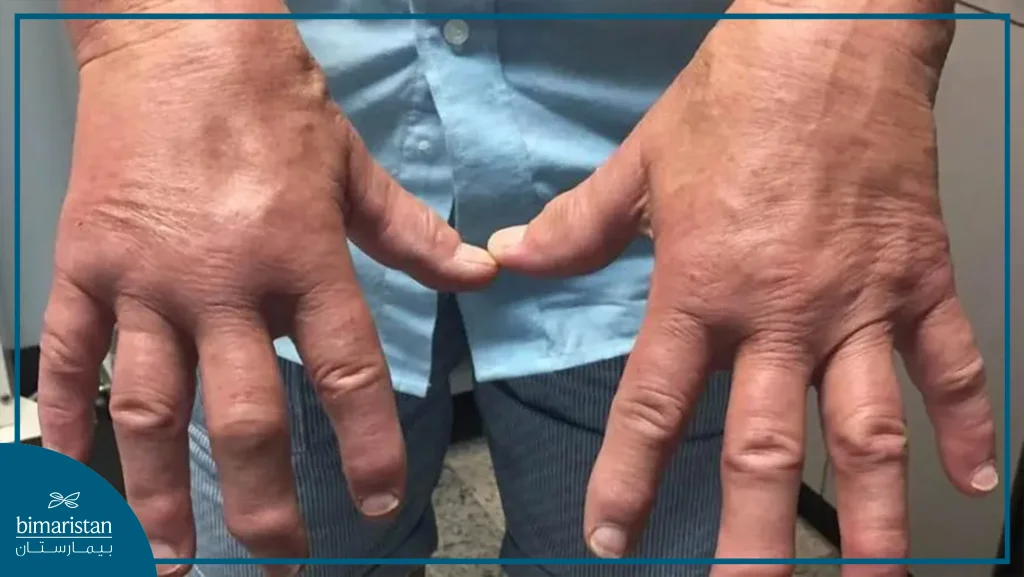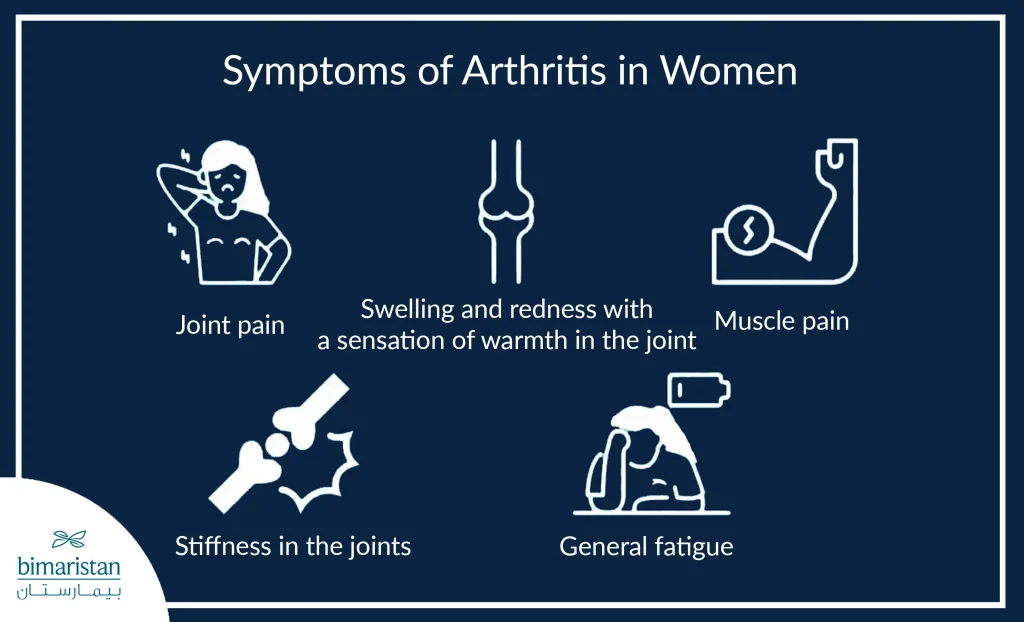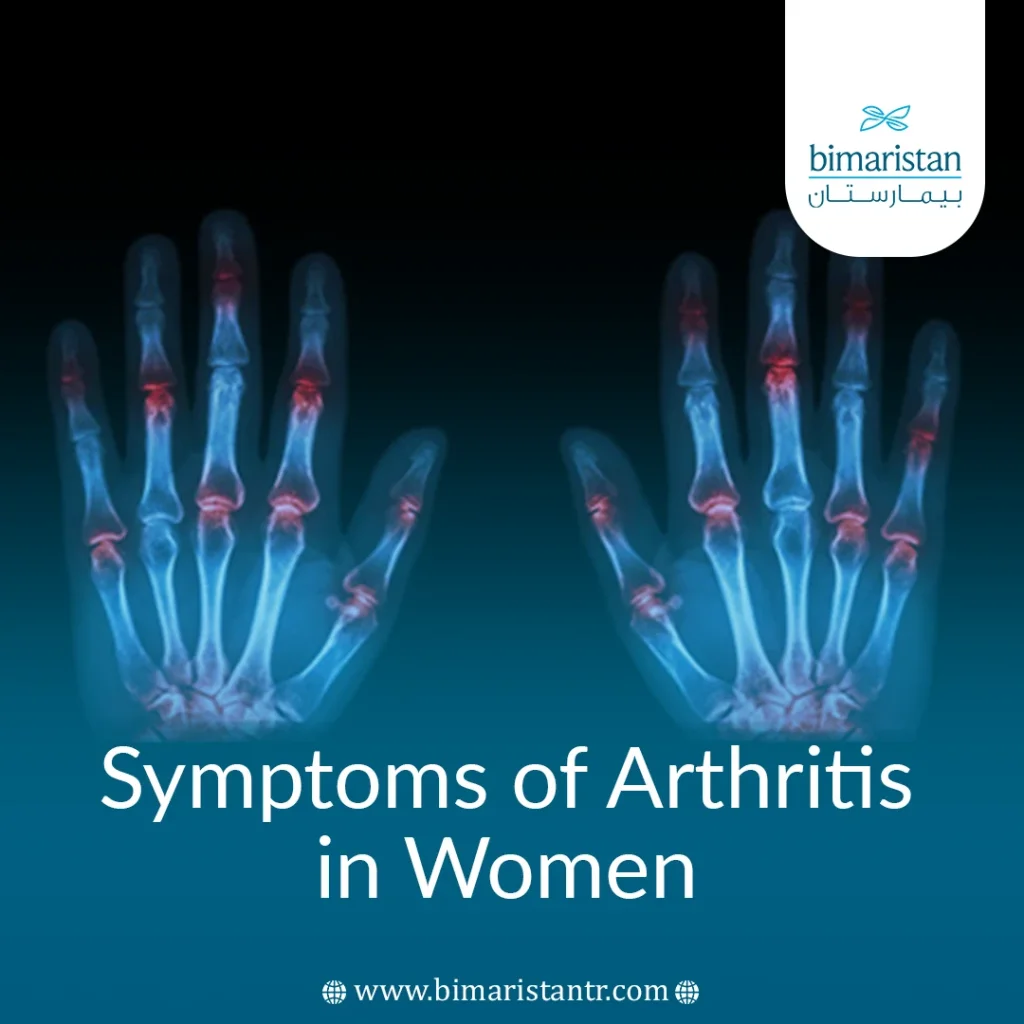Symptoms of arthritis in women are usually more severe than in men. A woman developing joint inflammation may experience severe pain that affects her quality of life.
Undoubtedly, hand and foot pain are among the most common symptoms experienced by women worldwide. This pain may be due to diseases unrelated to the joints, such as thyroid disorders and other conditions. Therefore, it is necessary to investigate the symptoms of arthritis in women to determine whether the cause is joint-related or not.
The two most common types of arthritis are rheumatoid arthritis and osteoarthritis. Despite their different causes and mechanisms, they share somewhat similar symptoms. Follow along to learn about all the symptoms of arthritis in women and how to treat it.
Symptoms of arthritis in women
Arthritis symptoms typically appear between the ages of 30 and 50, but this age group is not the only one affected. Children with this condition may also experience symptoms.
Symptoms often occur intermittently, sometimes disappearing and then intensifying at other times. They may be noticed at specific times, such as morning stiffness immediately after waking up.
The signs and symptoms of arthritis in women may vary from one woman to another, depending on the severity of the condition and the type of inflammation. However, when you have arthritis, you may notice one or more of the following symptoms:
Joint pain
Inflammation affects several joints in the body, causing pain, especially in the feet and hands, as well as in the knees and hips. Joint pain’s characteristics vary depending on the severity of the inflammation. It may be intermittent, coming and going, or constant and chronic.
Joint pain is often the first symptom experienced by arthritis patients. Initially, it may present as mild aching accompanied by a burning sensation.
Arthritis pain is typically more prominent during rest periods, distinguishing it from mechanical or traumatic causes of joint pain, which worsens with movement. However, strenuous joint activity, such as climbing stairs, may exacerbate arthritis pain shortly afterward, although pain usually does not occur during the activity.
Swelling and redness around the joint
Arthritis often accompanies swelling, redness, and a sensation of warmth when touching the joint. This symptom is mainly observed in rheumatoid arthritis in women, as inflammatory activity leads to increased blood flow and dilation of blood vessels in the inflamed area.
The degree of redness and swelling depends on the activity and severity of arthritis—the more active the disease, the more pronounced the joint swelling and redness. Swelling around the knee joint is most commonly observed. You can read more about the causes of swollen knee.

Joint stiffness
Stiffness or rigidity is one of the most common symptoms of arthritis in women. It refers to difficulty and limitation in joint movement. If you experience difficulty bending and moving your fingers for a period estimated at 30 minutes after waking up, you may have joint inflammation. The duration required for stiffness to resolve varies depending on the type and severity of inflammation.
There is no need to worry if you are experiencing symptoms of rheumatoid arthritis. According to research and statistical studies, more than a quarter of women in the United States are affected by the disease, whether it is rheumatoid or another type.

Arthritis symptoms in pregnant women
The natural weight gain during pregnancy can exacerbate the severity of arthritis symptoms (rheumatoid arthritis in pregnant women) due to increased pressure on the joints. It is usual for pregnant women with rheumatoid arthritis to experience intensified joint pain and feel that the symptoms of the disease have become more pronounced, especially in the knee joint.
It is advisable for women who have been diagnosed with arthritis before pregnancy to consult a doctor during pregnancy to assess and review the medications they are taking for treatment. Some medications may need to be changed during pregnancy due to their potentially harmful effects on the fetus.
As mentioned earlier, experiencing increased symptoms during pregnancy is a normal occurrence, not only due to the natural weight gain but also due to psychological factors and mood swings experienced by pregnant women.
Causes of arthritis in women
Women are more susceptible to arthritis compared to men, whether the inflammation is rheumatoid or osteoarthritis. The prevalence of the condition is not the only difference; symptoms of arthritis in women are more severe and bothersome than in men. This is believed to be due to the combination of several factors, including:
Rheumatoid arthritis immune factor (RF)
The cause of rheumatoid arthritis is a malfunction in the body’s immune mechanism, meaning that your body’s immune system attacks the natural tissue in the joints, causing an inflammatory reaction and resulting in the appearance of symptoms of arthritis in women.
In general, women are more prone to autoimmune diseases, with up to four times the incidence rate compared to men. Several hypotheses have been proposed to explain these results. Some attribute this to genetic and biological factors, others point to the role of female hormones in causing this, and some suggest the contribution of environmental factors. However, none of these hypotheses have been proven yet.
Factors contributing to osteoarthritis
Similar to rheumatoid arthritis, women are more prone to osteoarthritis than men, especially women over the age of 50, particularly those who have entered menopause (menopause arthritis).
The leading causes of osteoarthritis are weight gain and obesity, which increase the stress on the joint, leading to its wear and tear and subsequent degeneration over time. Additionally, hormonal changes after women reach menopause contribute somewhat to an increased risk of developing joint diseases and the appearance of symptoms of arthritis in women.
Treatment of arthritis in women
The main goal of treatment is to alleviate symptoms and improve quality of life, as there is no definitive cure for arthritis. However, following a good treatment regimen may help control inflammation symptoms and alleviate joint pain significantly.
There are several ways to manage and treat arthritis, including:
Medication for arthritis in women
The appropriate medication varies depending on the type of inflammation, but usually one of these medications is used:
Non-steroidal anti-inflammatory Drugs (NSAIDs)
This group of drugs is used to relieve joint pain and reduce inflammation. They are available over the counter and include common medications like ibuprofen, which is widely used as a pain reliever. However, attention should be paid to potential side effects, such as gastrointestinal ulcers.
Corticosteroids
Steroids are used to treat rheumatoid arthritis, suppressing the body’s immune response and reducing inflammatory symptoms. However, they may be accompanied by side effects if misused without consulting a doctor.
Arthritis treatment in women through plasma injections
Modern medicine has developed a new method of treating joint diseases, where human plasma injections from blood are injected into the affected joint. This treatment has proven effective in treating a wide range of joint diseases.
You can read more about knee plasma injections.
Arthritis treatment through surgery
In severe stages of osteoarthritis, joint replacement surgery may be the most appropriate option to alleviate the patient’s pain and improve their quality of life, especially in cases of knee arthritis. Knee joint replacement surgery, replacing it with an artificial joint, has become a widely used and relatively easy procedure.
Physical therapy and rehabilitation can also improve the range of motion and regain joint strength.
Prevention of arthritis symptoms
Healthy lifestyle modifications may help prevent and alleviate arthritis symptoms, whether rheumatoid or osteoarthritis.
Here are some important instructions and tips to alleviate symptoms of arthritis in women and prevent them:
- Weight loss in cases of obesity
- Regular exercise that does not require heavy lifting
- Avoiding smoking
- Applying ice packs or warm compresses to the inflamed area
In conclusion, symptoms of arthritis in women are highly prevalent and can impact the lives of patients through severe pain, stiffness, and other symptoms. Therefore, diagnosing inflammation begins with distinguishing signs and symptoms and then consulting your doctor, who will conduct the necessary tests to initiate early treatment.
References:
- Women, Men, and Osteoarthritis.
- SUBFERTILITY BEFORE AND AFTER THE DEVELOPMENT OF RHEUMATOID ARTHRITIS IN WOMEN.
- Overview of arthritis – A Public Health and Clinical View, Brooke Rossheim, M.D., M.P.H. Public Health Physician Specialist, Office of Epidemiology, Virginia Department of Health.



